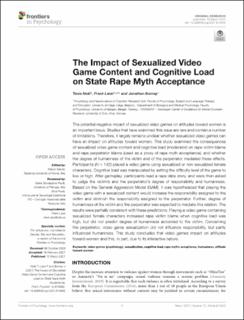| dc.contributor.author | Noël, Tania | |
| dc.contributor.author | Larøi, Frank | |
| dc.contributor.author | Burnay, Jonathan | |
| dc.date.accessioned | 2021-09-02T09:17:16Z | |
| dc.date.available | 2021-09-02T09:17:16Z | |
| dc.date.created | 2021-07-19T21:14:56Z | |
| dc.date.issued | 2021 | |
| dc.identifier.issn | 1664-1078 | |
| dc.identifier.uri | https://hdl.handle.net/11250/2772490 | |
| dc.description.abstract | The potential negative impact of sexualized video games on attitudes toward women is an important issue. Studies that have examined this issue are rare and contain a number of limitations. Therefore, it largely remains unclear whether sexualized video games can have an impact on attitudes toward women. This study examined the consequences of sexualized video game content and cognitive load (moderator) on rape victim blame and rape perpetrator blame (used as a proxy of rape myth acceptance), and whether the degree of humanness of the victim and of the perpetrator mediated these effects. Participants (N = 142) played a video game using sexualized or non-sexualized female characters. Cognitive load was manipulated by setting the difficulty level of the game to low or high. After gameplay, participants read a rape date story, and were then asked to judge the victim’s and the perpetrator’s degree of responsibility and humanness. Based on the General Aggression Model (GAM), it was hypothesized that playing the video game with a sexualized content would increase the responsibility assigned to the victim and diminish the responsibility assigned to the perpetrator. Further, degree of humanness of the victim and the perpetrator was expected to mediate this relation. The results were partially consistent with these predictions: Playing a video game containing sexualized female characters increased rape victim blame when cognitive load was high, but did not predict degree of humanness accorded to the victim. Concerning the perpetrator, video game sexualization did not influence responsibility, but partly influenced humanness. This study concludes that video games impact on attitudes toward women and this, in part, due to its interactive nature. | en_US |
| dc.language.iso | eng | en_US |
| dc.publisher | Frontiers Media | en_US |
| dc.rights | Navngivelse 4.0 Internasjonal | * |
| dc.rights.uri | http://creativecommons.org/licenses/by/4.0/deed.no | * |
| dc.title | The Impact of Sexualized Video Game Content and Cognitive Load on State Rape Myth Acceptance | en_US |
| dc.type | Journal article | en_US |
| dc.type | Peer reviewed | en_US |
| dc.description.version | publishedVersion | en_US |
| dc.rights.holder | Copyright 2021 Noël, Larøi and Burnay | en_US |
| dc.source.articlenumber | 614502 | en_US |
| cristin.ispublished | true | |
| cristin.fulltext | original | |
| cristin.qualitycode | 1 | |
| dc.identifier.doi | 10.3389/fpsyg.2021.614502 | |
| dc.identifier.cristin | 1922140 | |
| dc.source.journal | Frontiers in Psychology | en_US |
| dc.identifier.citation | Frontiers in Psychology. 2021, 12, 614502. | en_US |
| dc.source.volume | 12 | en_US |

